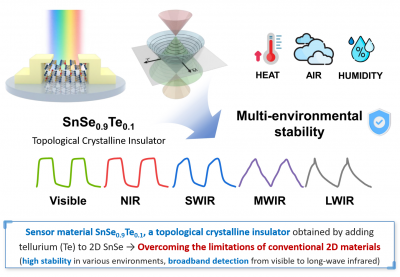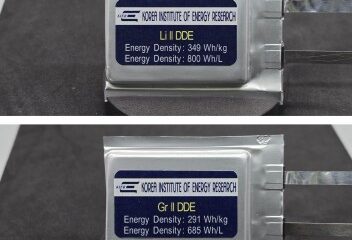Science
New Broadband Photodetector Material Developed by South Korean Researchers

A team of researchers from South Korea has made a significant advancement in photodetector technology. Led by Dr. Wooseok Song of the Korea Research Institute of Chemical Technology (KRICT) and Professor Dae Ho Yoon from Sungkyunkwan University, the team developed a new broadband photodetector material capable of sensing a wider range of wavelengths than existing commercial options. This innovative material also boasts a cost-effective synthesis process on a 6-inch wafer-scale substrate.
The new photodetector material is designed to enhance applications in various fields, including telecommunications, environmental monitoring, and medical diagnostics. By integrating day-night recognition and distance measurement capabilities, this technology offers a versatile solution for complex sensing tasks. The ability to detect a broad spectrum of wavelengths allows for improved accuracy and functionality in real-world applications.
In achieving this breakthrough, the research team focused on optimizing the synthesis process. Utilizing a 6-inch wafer-scale substrate enables mass production while maintaining a low cost. This aspect is particularly crucial for industries looking to implement advanced photodetectors without incurring prohibitive expenses. The new material represents a promising step toward making sophisticated optical technology more accessible.
As the demand for high-performance photodetectors continues to grow, this development positions South Korean researchers at the forefront of the field. The integration of day-night recognition and distance measurement capabilities sets the new material apart from competitors. These features not only enhance the functionality of photodetectors but also open doors to innovative applications that were previously unattainable with existing technologies.
The research findings were reported in September 2023, marking a pivotal moment for both the academic community and the tech industry. This achievement highlights the importance of collaboration between research institutions and universities in driving innovation. Dr. Wooseok Song and Professor Dae Ho Yoon have emphasized the potential impact of their work on various sectors, suggesting that their advancements could lead to significant improvements in both everyday technology and specialized applications.
As industries increasingly rely on advanced materials for enhanced performance, the implications of this research extend beyond South Korea. Global markets could see a shift in how photodetectors are manufactured and utilized, paving the way for smarter, more efficient systems. The commitment to cost-effective production coupled with technological innovation suggests a bright future for this new broadband photodetector material.
This development not only showcases the capabilities of South Korean researchers but also reinforces the country’s position as a leader in the global technology landscape. With ongoing efforts to refine and expand this technology, the research team is poised to make lasting contributions to the field of photonics.
-

 Technology5 months ago
Technology5 months agoDiscover the Top 10 Calorie Counting Apps of 2025
-

 Technology3 weeks ago
Technology3 weeks agoOpenAI to Implement Age Verification for ChatGPT by December 2025
-

 Health3 months ago
Health3 months agoBella Hadid Shares Health Update After Treatment for Lyme Disease
-

 Health3 months ago
Health3 months agoAnalysts Project Stronger Growth for Apple’s iPhone 17 Lineup
-

 Health3 months ago
Health3 months agoErin Bates Shares Recovery Update Following Sepsis Complications
-

 Technology5 months ago
Technology5 months agoDiscover How to Reverse Image Search Using ChatGPT Effortlessly
-

 Technology3 months ago
Technology3 months agoElectric Moto Influencer Surronster Arrested in Tijuana
-

 Technology2 months ago
Technology2 months agoDiscover 2025’s Top GPUs for Exceptional 4K Gaming Performance
-

 Technology5 months ago
Technology5 months agoMeta Initiates $60B AI Data Center Expansion, Starting in Ohio
-

 Technology5 months ago
Technology5 months agoRecovering a Suspended TikTok Account: A Step-by-Step Guide
-

 Health5 months ago
Health5 months agoTested: Rab Firewall Mountain Jacket Survives Harsh Conditions
-

 Lifestyle5 months ago
Lifestyle5 months agoBelton Family Reunites After Daughter Survives Hill Country Floods





















